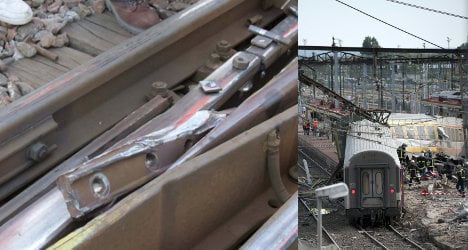Christian Brochet, a retired 77-year-old engineer from the town of Brétigny-sur-Orge, where last week's fatal crash took place, wrote to France's national rail operator SNCF almost three years ago, warning them that track conditions at the local train station could cause a “catastrophe", French daily Le Parisien revealed on Thursday.
SNCF responded three months later reassuring Brochet; “There is no safety risk.”
In the letter, dated November 25th 2010 and shown to French daily Le Parisien on Thursday, Brochet writes: “The other day, to my astonishment, I noticed 36 faults with the binding of the track closest to me,” referring to track 2, which is next to track 1, where Friday’s derailment took place.
The former engineer also pointed out that on a 100-metre stretch of the track, a few dozen large bolts, which fix the rail to the sleepers, were loose, broken, or missing.
“This track is largely used by RER trains that don’t pass through the station too quickly, but high-speed trains do also use it,” he added.
“So – where is the maintenance that should ensure good service and safety? What I saw was only a small section of the track. What am I to think about the rest of the network?” Brochet asked.
No maintenance fault
Le Parisien reports that three months later, on February 15th 2011, SNCF responded in a letter to Brochet in which they dismissed his safety fears.
“I have to assure you there is no maintenance fault in this area,” the rail provider wrote.
“Its condition is known to us, has been monitored, and conforms to all standards. There is no safety risk,” the letter claimed, before stating, however, that "works were planned to restore the effectiveness of connections".
Shocked by the response of SNCF, Brochet sent a follow-up letter on February 25, 2011 warning the rail provider, in chillingly prescient terms, what might happen.
“The absence of screwed-in connections that I observed constitutes a serious error and could lead to a catastrophe,” he wrote in his second letter.
'It doesn't take an expert to notice a missing screw'
As Brochet had feared, that catastrophe occurred, albeit on a different track, at Brétigny-sur-Orge, on July 12th, when a train travelling from Paris to Limoges derailed on track 1, killing six people, including a couple aged in their 80s, and injuring dozens more.
The next day, SNCF chief Guillaume Pépy said the accident had been caused by a connecting bar that had come loose at a rail switch at the station.
Pierre Izard, the SNCF's general manager for infrastructure said the joint bar "broke away, it became detached and came out of its housing."
Speaking to Le Parisien on Thursday, Brochet insisted his judgement was accurate at the time, pointing out that he himself had run a business in the Paris region for years, producing metal parts for use by SNCF.
“I know off by heart every element that makes up a train track,” he added.
“SNCF’s letter proves they knew the track was in a bad state. The lack of maintenance was as plain as the nose on your face,” said Brochet.
“It doesn’t take an expert to see that a screw is missing,” he added
'Regulations scrupulously followed'
A spokesman for SNCF declined to comment to The Local on Thursday, but a separate spokesman told Le Parisien that the number of faulty attachments noticed by Brochet in 2010 wasn’t enough to justify taking immediate action.
“There are 666 of these attachments along the length of track 2 at Brétigny,” said the spokesman.
“Christian Brochet saw 36 that he considers faulty. So that gives us 11 percent faulty equipment. The standards clearly state that immediate intervention is required when 30 percent of attachments are observed to be faulty,” the spokesman added.
“The regulations, therefore, were scrupulously respected,” he concluded.



 Please whitelist us to continue reading.
Please whitelist us to continue reading.
Member comments